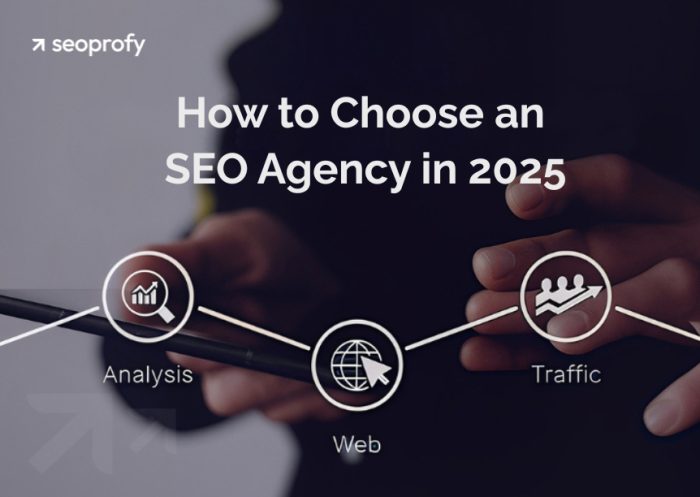When you’re trying to hire an SEO agency, you already know how much is at stake. A good partner can turn your site into a reliable growth channel that brings in traffic, leads, and sales. A bad one can waste months of your time and budget without ever tying their work to results.
And the hardest part is, you often can’t tell the difference at the start. Most agencies talk about the same things: audits, backlinks, technical SEO, and content. But very few explain how that work connects to your business goals or what you should expect to see over time. This post will make the selection process easier. You’ll see:
- What to check on an agency’s website before you even reach out
- What questions to ask before signing anything
- What red flags to watch out for, even if the company sounds convincing
In this guide, you’ll learn how to evaluate SEO partners, avoid pitfalls, and make a choice based on your growth goals. Let’s get into it.
- Businesses that are looking to find an SEO partner need to first define the goals they want to achieve with SEO.
- The best places to research reliable agencies are search engines, directories, communities, and professional networks.
- You’ll need to assess each agency’s credibility through case studies, testimonials, and proven industry recognition.
- Potential red flags to look for when choosing an SEO company are guaranteed rankings, unethical SEO tactics, and poor communication.
Know What You Need SEO For
Let’s start with the basics. The moment you decide to hire an SEO agency, you need to be clear on what it is you want to achieve. If you don’t define these goals early on, it’s easy to fall for vanity metrics like impressions that look good in a report but don’t directly contribute to leads, sales, or revenue.
That said, when you work with a reliable agency, they won’t treat traffic or any other surface-level metric as the end goal. They’ll ask what kind of ROI you’re aiming for and build the strategy around that.
Match the Type of SEO to What You Need
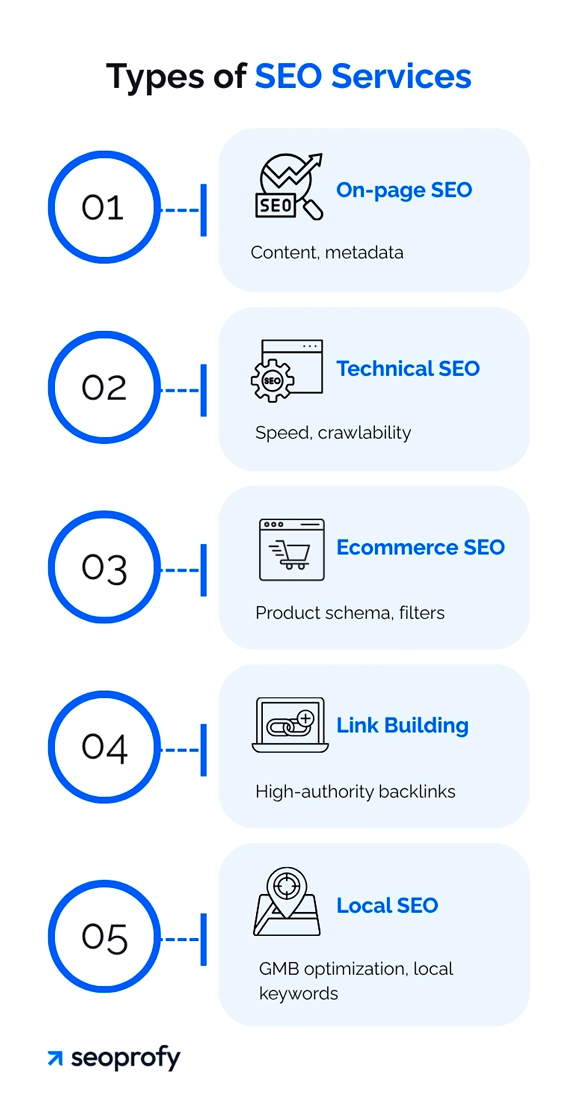
Not all search engine optimization is the same, and not every agency is built for the kind of work you might need. So, before you decide who to hire, it helps to know what type of SEO services match your goals.
- On-page SEO is one of the most common services. It means editing what’s already on your site, such as page copy, titles, meta descriptions, and internal links. These updates help your website improve search engine rankings and bring in more organic traffic.
- Technical SEO is needed when certain technical issues are stopping your pages from being crawled, indexed, or ranked. These could be fixes related to slow loading times, broken internal links, duplicate content, or incorrectly set up redirects.
- Ecommerce SEO is a go-to service for online shops that want their product and category pages optimized for better visibility. It mostly deals with URL structures, filters, product schema markup, and platform-specific issues.
- Link building boosts your domain authority and page relevance by acquiring backlinks from trusted, high-authority sites in your niche. A reliable SEO company can build high-quality backlinks to your key pages and push them higher in the search results.
- Local SEO makes sense if you work in specific regions and need to show up in Google Maps or local listings. Agencies that specialize in local optimization help you set up or improve your Google Business Profile, optimize pages, and increase your website traffic for high-intent local keywords.
Generally, a respected SEO firm won’t throw all of these services at you. They’ll look at what you’re trying to achieve and suggest services that go hand-in-hand with your goals.
Define What Success Looks Like
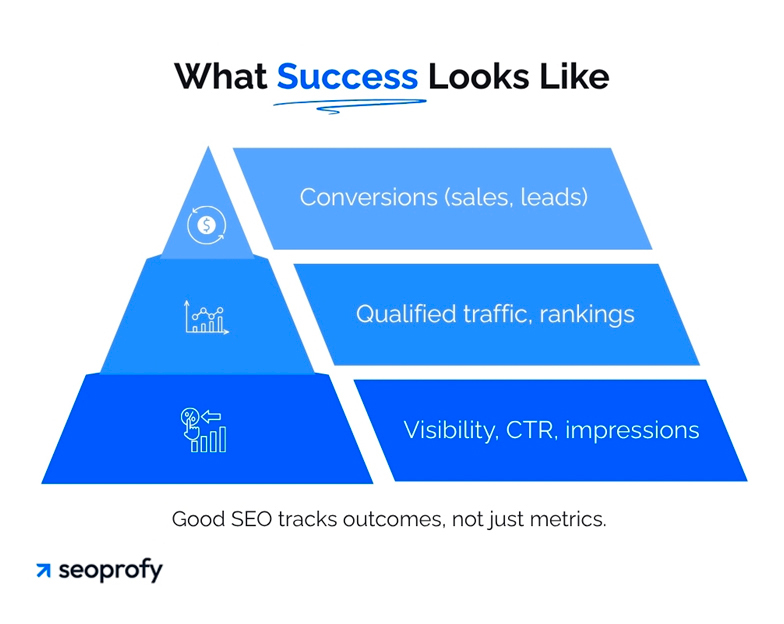
Success in SEO means you’re seeing progress toward specific outcomes. Depending on your business, that might look like:
- Consistent traffic growth to your commercial pages
- Higher rankings for keywords that draw in qualified visitors
- More demo requests, contact form submissions, or product sales
- Increased conversion rates from content that previously underperformed.
A reputable agency will bring up your KPIs from day one. In case they don’t, it’s probably a sign they’re not the right fit.
At SeoProfy, we personalize each SEO campaign around your industry and, more importantly, the KPIs that matter for your business. Here’s what you get when working with us:
- Regular reports
- Access to in-house tools
- Clear communication

Do a Broad Research of Agencies
At the beginning of your search, don’t limit yourself to only one source. Sometimes, the best SEO companies for your business might not rank first on Google or show up in ads.
Search Google, Browse Marketplaces, Ask Peers
Google and Bing are a good place to start, but don’t assume the top results are your best options. What matters here is how they describe their services, who they’ve worked with, and how they present their experience.
One way to check someone’s expertise in the field is to type in the service you’re interested in and see what agencies show up in Google’s AI Overview. They highlight agencies whose content demonstrates topical authority and relevance — an indirect signal of expertise in that field.
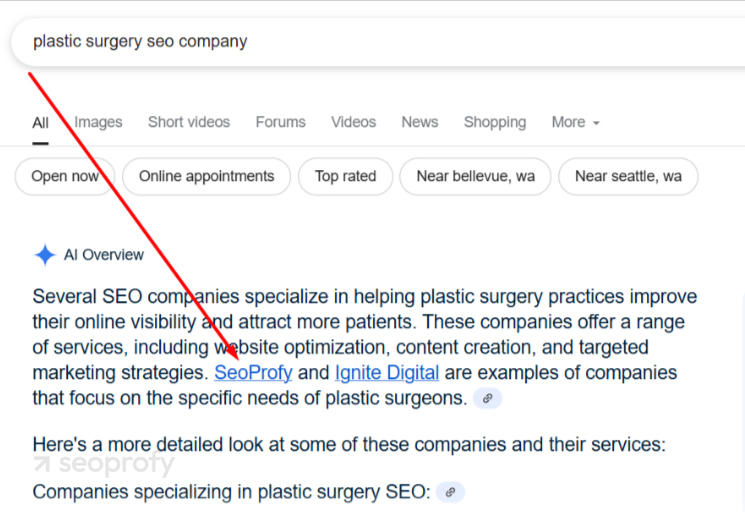
It doesn’t mean that the website mentioned in AI summaries is the right SEO agency for you, but it can point you toward the ones that have already worked with clients in your industry.
Then check out directories like Clutch, where professional agencies have their profiles. You’ll get to see their reviews, case studies, and a feel for the kinds of projects they’ve handled. Here’s our profile, for example.
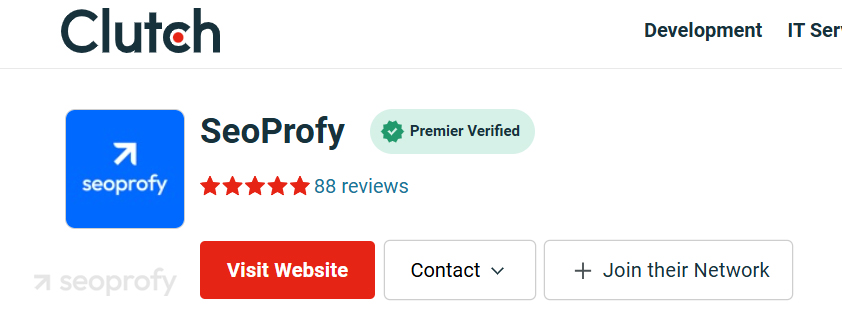
Another channel that can give you a quick sense of how visible and active the company seems is LinkedIn. Some SEO teams use this platform to share results, process tips, or examples of client work, which tells you a lot more than a static website ever could.
And, of course, don’t overlook your own network. If you know someone who’s already found a reputable SEO company and has achieved better online visibility thanks to them, you could reach out with a short message and ask them for a recommendation.
Compare Agency Specialization, Size, Client Fit
After you’ve gathered a list of names, look at what each agency’s line of expertise is. Some might work with ecommerce brands, others with local markets. The point is, you’ll need to narrow down your selection to the ones that specialize in your niche.
At the same time, check how big the agency is and how it approaches each client. The larger ones might have more niche experts and can help you build a comprehensive, customized SEO plan tailored to your business. This might not be the case with smaller teams that can only handle one or a few areas of search engine marketing well.
Evaluate the Agency’s Credibility
This part is more important than it looks, because you will be trusting someone with your site, and your reputation is on the line, too. Let’s look at the list of questions you’ll need to ask to choose an SEO company with the right experience and results:
- How long have they been doing SEO?
- Do they show any industry awards or certifications?
- Is there a mention of Google’s guidelines and the use of ethical SEO practices?
At the same time, go through their blog and look at who’s behind the content. Do the authors show up on LinkedIn? The point here is that you’re looking for signs that the information they post is credible and trustworthy.
Check Case Studies, Testimonials, and Portfolios
The fastest way to get a sense of an agency’s credibility is through the results they’ve already delivered for other clients. So, in addition to earlier questions, review the following:
Case studies: Check their past results to understand what kind of problems they were solving, and how they approached them. Look for concrete details: what SEO campaigns they ran, how they communicated with the client, and what outcomes they were able to deliver.
Client testimonials: Review detailed client feedback to gauge satisfaction, transparency, and communication. Do they sound like real people sharing genuine feedback? Bonus points if they include names, job titles, or even a link to the client’s website.
Portfolios: Some agencies showcase previous projects as part of their website or proposals. Analyze these to see the types of businesses they’ve worked with and whether any of them are similar to yours.
As you’re looking through these, check the actual numbers. Can you see how traffic, leads, or revenue changed over time? Are there screenshots, charts, or links to pages that ranked?
At our agency, for example, we add the screenshots from SEO tools in our case studies to show how our strategies affected the client’s search visibility. Here’s an example from one of such studies, where we helped a website regain its organic traffic after a Google update.


Of course, screenshots are just one way to back up the companies’ claims with data. Another way is to look at the reports they provide.
Ask for Transparent Reporting Examples
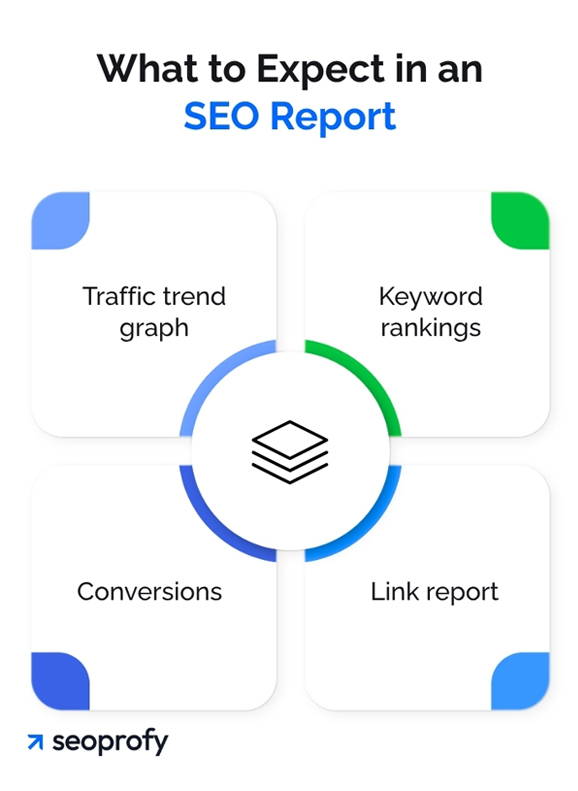
Okay, at this point, you’ve probably seen enough. Now it’s time to reach out to them to ask what kind of reports they usually send (unless you can find it on their site).
Ideally, it should tell you what was done and what SEO metrics changed. That includes traffic trends, keyword movements, backlink updates, and conversions.
At SeoProfy, we share a report that shows you how many leads came in, what the average cost per lead was, and how search visibility improved, such as ranking gains, impressions, and clicks for target pages.
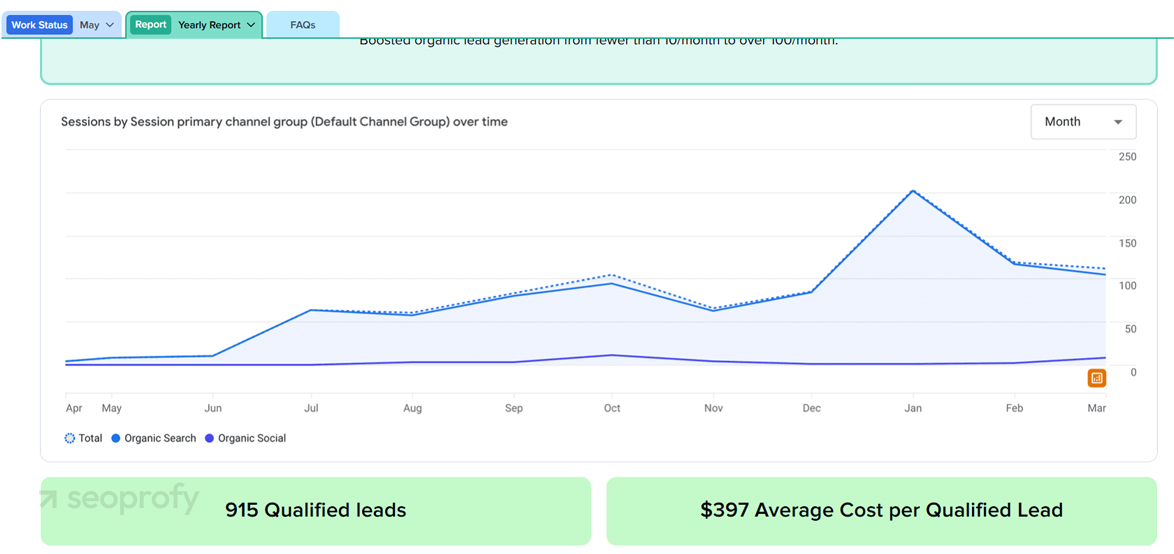
Overall, any good SEO agency will be transparent about its process and results. It’s the basis for a productive partnership that turns into better rankings in search engine results pages and more leads from your SEO efforts.
One thing we haven’t touched on yet is what exactly you’re paying for when working with SEO companies. Let’s go into that next.
Understand the Deliverables
When you choose an SEO company, deliverables are just as important as credibility signals. And that’s for two reasons. First, you need to understand what will be included in their services. Second, you want to double-check on how much time the team will dedicate to your business and what exact assets you’ll walk away with.
What’s Included in a Standard SEO Package?
Many SEO companies list this information on their sites, but there are also cases where you’d need to reach out and ask them directly. Still, some services are common in all SEO packages. These are:
- SEO audits
- Keyword research
- Technical SEO
- Content writing
- Off-page SEO
- Performance reporting
In addition to services, you’ll also need to clarify how much time goes into each task. If they say they’ll “do link building,” ask how many links they plan to acquire and how they intend to do so.
You’ll also want to understand the level of involvement. Do they just deliver recommendations, or do they implement changes directly on your site? Will you have a dedicated point of contact? The more answers you get, the easier it is for you to compare them and choose the right SEO company for your business.
Clarify the Pricing Model
The deliverables you get will also depend on the kind of pricing you choose. Generally, there are four main ways in which SEO companies charge:
Monthly retainer. This is the most common. You agree on a fixed monthly fee, and the agency handles a set scope of work each month. It mostly includes a mix of strategy, implementation, and reporting.
Hourly rate. You’re billed for the time spent. This model works well for one-off consulting, but it can get expensive if you need ongoing support.
Project-based: You pay a one-time fee for a defined service, such as an SEO audit. This model is straightforward, and you’ll know from the beginning what’s being done and for how much, but it’s usually limited in scope.
Performance-based: Some agencies charge based on the results they deliver (like leads or traffic). It may sound appealing at first, but it often comes with strict conditions and less control. If you decide to go with this model, be cautious and ask what metrics they’re tying their pricing to.
Identify SEO Red Flags
Hiring an SEO partner means you’re putting your website in their hands, so it’s worth looking out for signs that something might be off. Below, we’ll list some of the most common red flags to watch for when reviewing your shortlist.
Guaranteed #1 Rankings
Some companies still claim they can get you to the top of Google and do it fast. Even though that sounds nice, it’s not how SEO works. Search rankings change all the time, and no one has control over Google’s algorithm.
Even Google warns against these guarantees in its official documentation. What you want instead is a team that aims for sustainable growth rather than overnight wins that vanish just as quickly.
Vague Methodologies or Black Hat Tactics
The agency you plan to work with should be able to explain how its team plans to get results for your business. Otherwise, it might mean they use outdated or spammy techniques like cloaking, doorway pages, link schemes, or private blog networks (PBNs).
According to Google, these tactics can get your website penalized or removed from the index altogether. So always ask if the agency is using white-hat strategies in their campaigns and how exactly they’ve achieved success for previous clients.
Aggressive Sales Tactics and Lack of Accountability
Be careful with SEO companies that rush you into long-term contracts without answering your questions first. When they ignore your concerns or seem to disappear after the first call, that’s already telling you how they handle the rest.
It’s not uncommon for these agencies to use affordable SEO to get your attention, but they go quiet when it’s time to explain their work or show results. As a business owner, you’re better off working with a team that replies when you reach out and doesn’t make you chase them for updates.
Grow Your Business with SeoProfy
Now that you know how to choose an SEO company, you’ll have a much easier time making SEO a useful part of your digital marketing efforts. And if you’re wondering what it’s like to work with an expert team, here’s how we do things at SeoProfy.
We listen to your goals, audit your site, analyze your competition, and then build a customized strategy that fits neatly into your marketing stack. Our team aligns every SEO task with your business KPIs and provides clear metrics on traffic, conversions, and ROI.
All performance data is delivered in a concise, executive-ready format, making it easy to share internally with key stakeholders or decision-makers. Apart from that, you can expect:
- Transparency and open communication
- A team of niche experts who follow SEO trends and changes
- A dedicated account manager to support you
We understand that this is a high-stakes decision, so we offer a free consultation that doesn’t require any commitment on your end. Our consultants will talk with you about your business objectives and discuss how we can bring you closer to achieving long-term SEO success and steady business growth.

